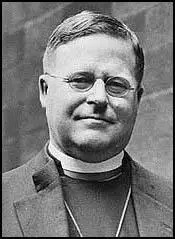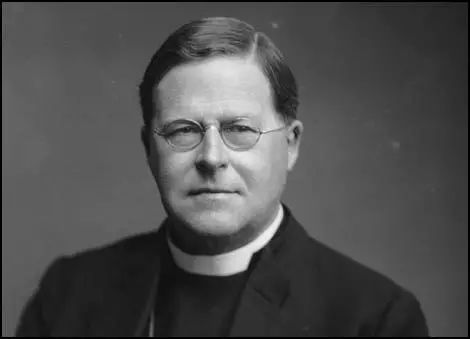William Temple

William Temple, the son of Frederick Temple, the Archbishop of Canterbury, was born on 15th October, 1881. He was educated at Rugby (1894-1900) and Balliol College, Oxford (1900-1904), where he was president of the student union.
Along with his friend, A. D. Lindsay, he became a tutor at the Workers' Educational Association (WEA). He was later to serve as the organization's president (1908-1924). Influenced by the ideas of Henry Scott Holland Temple decided to enter the Church and he was ordained on 19th December, 1909. The following year he became headmaster of Repton School.
During the First World War Temple he became the honorary chaplain to George V. He also edited the Challenge (1915-1918) and became the leader of the Life and Liberty Movement. A socialist, Temple joined the Labour Party in 1918.
In November 1920 David Lloyd George offered Temple the bishopric of Manchester. Temple became a national figure in 1926 when he joined with A. D. Lindsay in urging the government to seek a negotiated agreement to the General Strike.
Temple influenced future Conservative politicians. Edward Heath wrote in The Course of My Life (1988): "My Christian faith also provided foundations for my political beliefs. In this, I was influenced by the teaching of William Temple. Temple's impact on my generation was immense. He believed that a fairer society could be built only on moral foundations, with all individuals recognising their duty to help others. Like Lindsay, he was a socialist and, in his wish to redress the balance of power between those who own and those who produce, he sometimes failed to see that some would seek through socialist measures not justice, but power for its own sake. He was, however, the first Anglican leader for decades to set out the Church's teachings in modern terms. He propounded a view of morality which was not preoccupied with sexuality, but which was relevant to the myriad problems besetting the individual in the personal, professional and social spheres."
Temple also served as the Archbishop of York (1929-40) and the Archbishop of Canterbury (1942-44). In these posts he became an outspoken advocate of social reform and became involved in the campaign against unemployment, poverty and poor housing. George Bernard Shaw wrote: "to a man of my generation an archbishop of Temple's enlightenment was a realized impossibility".
In the 1930s United Christian Front gained the support of several church leaders. However, it soon became clear that it was a front for extreme right-wing politicians. In November 1937 William Temple and Donald Soper, a Methodist minister, wrote to The Times to condemn the United Christian Front: "We regret that so admirable an inspiration as the union of all Christians in resistance to the enemies of the Gospel should be bound up with judgments on contemporary events which are certainly precarious and to us appear mistaken."

During the Second World War Temple became more outspoken. The Conservative Party MP, Henry Channon, wrote in his diary: "The old Archbishop, heaven knows, was foolish and wicked enough, but the new obese one is positively dangerous. He now openly preaches Socialism from a platform which he shares with Cripps - Is England mad, and doomed? But perhaps it is as well that the Revolution should come from the top, rather than the bottom. But almost everything that I loved has disappeared in under three years."
Books by Temple include Church and Nation (1915), Personal Religion and the Life of Fellowship (1926), Christianity and the State (1928), Nature, Man and God (1934), Men Without Work (1938), Christianity and the Social Order (1942) and The Church Looks Forward (1944).
William Temple died at Westgate-on-Sea, Kent on 26th October, 1944. Winston Churchill, who had appointed Temple, was reported as being jubilant about his death, and remarked "Look, only 63, a teetotaller, and look at me, not a teetotaller, and 70".
Primary Sources
(1) Edward Heath, The Course of My Life (1988)
My Christian faith also provided foundations for my political beliefs. In this, I was influenced by the teaching of William Temple. Temple's impact on my generation was immense. He believed that a fairer society could be built only on moral foundations, with all individuals recognising their duty to help others. Like Lindsay, he was a socialist and, in his wish to redress the balance of power between those who own and those who produce, he sometimes failed to see that some would seek through socialist measures not justice, but power for its own sake. He was, however, the first Anglican leader for decades to set out the Church's teachings in modern terms. He propounded a view of morality which was not preoccupied with sexuality, but which was relevant to the myriad problems besetting the individual in the personal, professional and social spheres. On mainland Europe, the related but more conservative doctrines of Christian Democracy had, regrettably, been submerged by fascism and nationalism. But many of us were already intrigued and rather attracted by the apparent kinship of Christian Democratic thinking with our own moderate Conservatism, which we similarly predicated upon the view that the individual can be truly fulfilled only as part of a social unit.
(2) Henry (Chips) Channon, diary entry (27th September, 1942)
The old Archbishop, heaven knows, was foolish and wicked enough, but the new obese one is positively dangerous. He now openly preaches Socialism from a platform which he shares with Cripps - Is England mad, and doomed? But perhaps it is as well that the Revolution should come from the top, rather than the bottom. But almost everything that I loved has disappeared in under three years.
(3) Archbishop William Temple, Evening Standard (10th July, 1943)
I commend the endurance, mutual helpfulness, and constancy, which during the "blitz" reached heroic proportions but people are not conscious of injuring the war effort by dishonesty or by sexual indulgence. There is a danger that we may win the war abnd be unfit to use the victory.
(4) Frederic Iremonger, William Temple (1944)
During his two primacies three particular motives were to be discerned at the heart of his greatest efforts and achievements. Of these the first was the desire for social and national righteousness. This dominant passion possessed him from his earliest years; it had led him into the Workers' Educational Association and later into the Labour Party which he joined in 1918... In speeches throughout the country for the 'Religion and Life' campaign, in letters to The Times - here even his most loyal friends felt that he might have shown a more selective restraint - he developed his plea for justice and righteousness.
(5) Henry (Chips) Channon, diary entry (26th October, 1944)
Death, who has been on holiday, bagged both old Princess Beatrice, the Queen of Spain's mother and the Archbishop of Canterbury, today... The Archbishop was ... a fat fool of 63 with a fuddled, muddled brain, who really looked more like Queen Victoria than her daughter did. He was a Socialist, and Winston was much criticised for appointing him: now after 2 years he can put that right. Temple often consulted Rab in the Foreign Office days, and we were frequently obliged to alter his broadcasts, as they were so injudicious. He was then York. Winston is quoted as being jubilant about his death, and remarked "Look, only 63, a teetotaller, and look at me, not a teetotaller, and 70".

